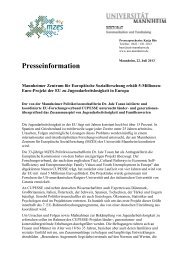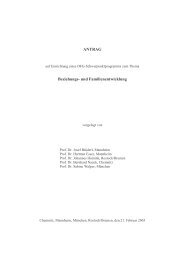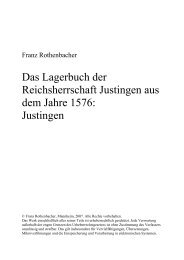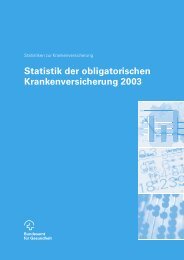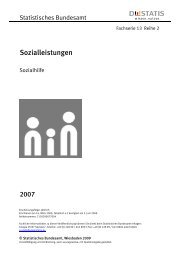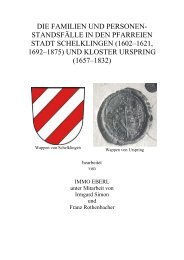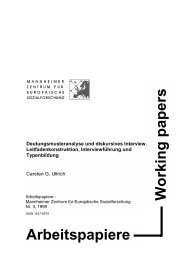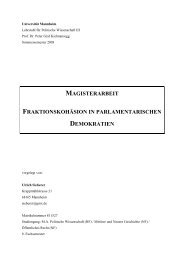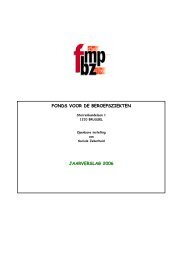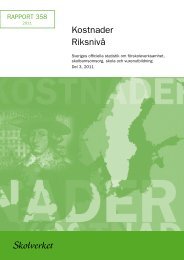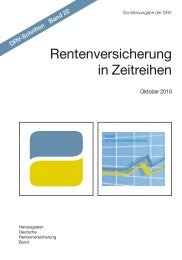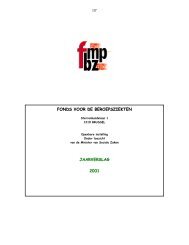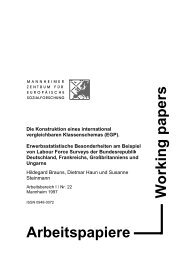Tobias Auberger and Tanja Hitzel-Cassagnes - Mzes
Tobias Auberger and Tanja Hitzel-Cassagnes - Mzes
Tobias Auberger and Tanja Hitzel-Cassagnes - Mzes
Create successful ePaper yourself
Turn your PDF publications into a flip-book with our unique Google optimized e-Paper software.
7<br />
openness <strong>and</strong> reversibility. Thus, constitutionalisation can only be regarded as being legitimate<br />
if it is able to meet these normative st<strong>and</strong>ards. Processes of justification inevitably<br />
rely on a specific structure embodying these principles, <strong>and</strong> ensuring the normative quality,<br />
or better: the “rational acceptability” of the outcomes.<br />
The accession of the new Member States, resp. the enlargement of the European Union, has<br />
often been viewed as a mere extension of the constitutionalising process we have so far observed,<br />
that means, not touching the status quo of the polity itself. Part of this view forms<br />
the idea that the new Member states fit in smoothly without “really” making a difference.<br />
The problem is that this view is not able to acknowledge the new Member States’ status as<br />
equally being able to induce change <strong>and</strong> to influence the very process of constitutionalisation<br />
– bluntly speaking, this view represents much more a perspective of colonialisation.<br />
Another idea is related to the expectation, that the new Member States incorporate the body<br />
of existing European law (i.e. the “acquis communautaire”) of the “European Constitution”<br />
without dissent <strong>and</strong> derogation. Furthermore, they are not expected to shift the margins of<br />
interpretation <strong>and</strong> dispose of contested meanings <strong>and</strong> concepts. We have already remarked<br />
that this perception is in normative terms dissatisfying because it neglects the requirement<br />
of procedural openness of processes of European constitutionalisation in order for them to<br />
be acceptable <strong>and</strong> legitimate. Apart from that, we suggest to regard accession as a “foundational”<br />
situation that should be considered as being in normative terms an opportunity or<br />
chance. To our mind, it is useful to interpret enlargement as a kind of structurally determined<br />
point of constitutional reflexivity. In this perspective, accession should be seen as a<br />
“Sollbruchstelle” of European Constitutionalisation. Insofar as the new Member states are<br />
of equal stance for European Integration, their participation includes the possibility of contestation<br />
<strong>and</strong> potential reversibility – which are, in our point of view, exactly the normativeprocedural<br />
requirements of constitutionalisation. So, within this framework, integration is<br />
to be conceptualised as processes of mutual recognition <strong>and</strong> underst<strong>and</strong>ing. In particular, it<br />
highlights the role of reciprocal dialogues which, apart from ensuring the acceptability of<br />
the outcomes, foster mutual learning-processes. At this point of the argumentation, we<br />
would like to take the idea that mutual learning processes form the baseline of (in normative<br />
terms successful) accession-processes as a point of departure for a closer look at different<br />
(institutional, structural or practical) problems associated with an enlarged Union. This



